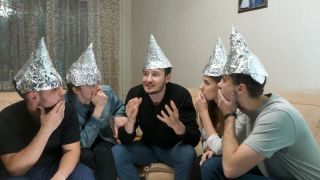Bias
Why We Are Suckers for Conspiracy Theories
Once formed, conspiratorial beliefs are very hard to undo.
Posted April 25, 2023 Reviewed by Ekua Hagan
Key points
- While some may fall prey to conspiracy theories more easily, anyone can fall for the "right" one.
- This is due to biases in how we process information.
- Confirmation bias, false consensus, and the mere exposure effect are key in perpetuating conspiracy theories.
- Conspiracy theories can be especially seductive in an atmosphere of fear.

Conspiracy theories are often about believing that there is a cabal of bad actors out there who are hell-bent on creating mischief and misfortune for the rest of us.
Some people are more susceptible to conspiracy theories than others. For example, people who are uncomfortable with ambiguity and who need compelling explanations for the events surrounding them are more likely to embrace conspiracy theories, as are people who believe in paranormal phenomena such as ghosts and psychic powers.
Believing in one conspiracy theory also predicts a tendency to believe in other conspiracy theories, as long as the conspiracy theories do not conflict with each other. For example, it is unlikely that an individual who believes in the conspiracy theory that Princess Diana was murdered by the royal family will also endorse the conspiracy theory that Diana faked her own death and is still alive.
Although some people embrace the latest conspiracy theory more quickly than others, the fact that any of us can be suckers for even the most outlandish conspiracy theory can be traced to certain inherent cognitive biases that we all share.
Confirmation Bias and Belief Perseverance
We have a strong propensity to seek out and remember information that confirms things that we believe to be true, and we quickly dismiss and forget information that challenges our beliefs. Consequently, we are vulnerable to misinformation that reinforces our worldview and confirms our suspicion that people we do not like are just as sinister and untrustworthy as we think they are.
We very easily slide down the slippery slope that begins with being skeptical and suspicious about why Anthony Fauci wants us all to get vaccinated and ends with believing that Democrats and Hollywood elites are Satan-worshipping pedophiles who eat babies and steal elections.
Once formed, these conspiratorial beliefs are very difficult to undo, especially if we have publicly and forcefully expressed them; the cognitive dissonance that would arise from doing so is simply too hard to overcome. Furthermore, attacks on misinformation can also easily be perceived as an attack on our intelligence, our religion, or our identity, which makes us dig in our heels even more.
False Consensus
We tend to think that our own behaviors, values, and beliefs are “normal.” In other words, we think that what we believe and how we behave are typical of how most other people think and behave. Psychologists refer to this as “false consensus.”
The echo chambers of our favorite social media and cable TV news convince us that our views are in fact shared by most people, and this can make us feel pretty smart and confident. In such echo chambers, even the wackiest conspiracy theories acquire a veneer of truth and rationality that seem incomprehensible to people outside of the bubble.
The "Mere Exposure" Effect
One of the most reliable laws of social psychology is something called the mere exposure effect. In a nutshell, this means that within certain limits, the more familiar we are with something and the more often we are exposed to it, the more we tend to like it. This works for other people, consumer products, songs on the radio, and sadly, even for conspiracy theories.
The repetition of misinformation makes it more familiar, more likable, and more believable. After all, why would it still be circulating if it wasn’t true? So, repeated exposure to theories that we like carries much more weight than any debunking of these theories that we may encounter.
Conspiracy theories can be especially seductive in an atmosphere of fear. If we truly believe that the very survival of things that we hold dear is in jeopardy, we will cling to anything that helps us identify the individuals who pose a threat to us and enthusiastically enlist to do whatever is necessary to defuse the threat.


